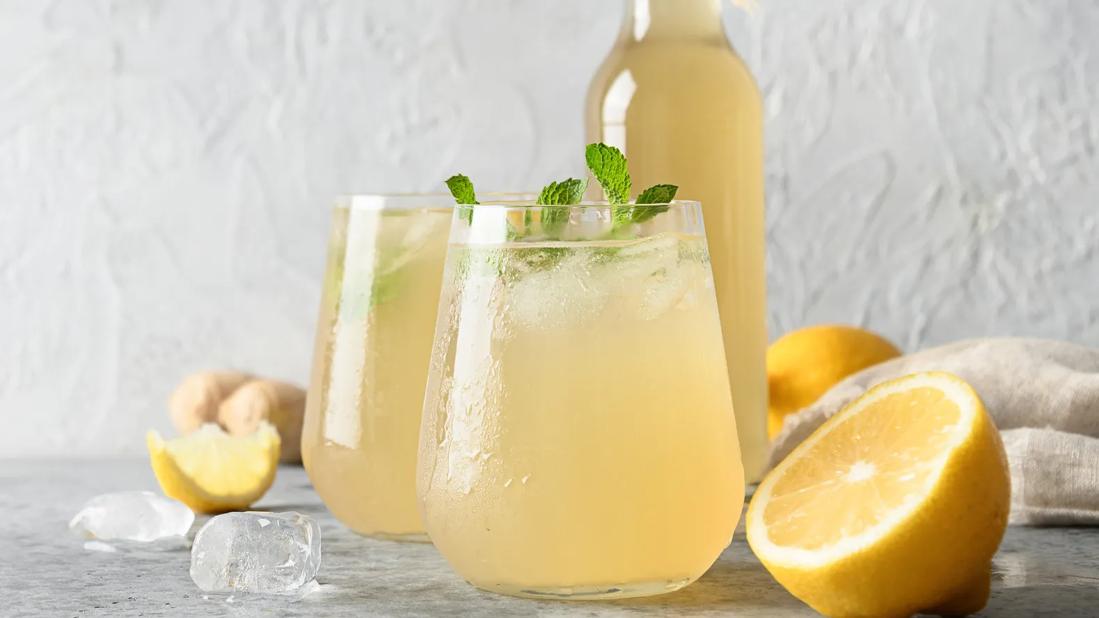If you’re looking to boost your gut health, it’s better to get fiber from whole foods

Image content: This image is available to view online.
View image online (https://assets.clevelandclinic.org/transform/6b216078-536e-40d8-add3-7ace3e24696b/probiotic-soda-1326477999)
Glasses and bottle of yellow-colored prebiotic soda, with mint, lemon and ginger garnish
The healthy beverage business is booming. You can find flavored seltzers, vitamin-infused water and now, prebiotic sodas. Yep, the same ones you may have seen all over social media.
Advertisement
Cleveland Clinic is a non-profit academic medical center. Advertising on our site helps support our mission. We do not endorse non-Cleveland Clinic products or services. Policy
“The publicity about these sodas has increased awareness of the importance of dietary fiber,” says registered dietitian Julia Zumpano, RD, LD.
But you may wonder what’s in these drinks and whether they live up to their promise to improve digestive health.
Zumpano shares the scoop on this bubbly trend and why there are better ways to care for your gut.
Prebiotic soda is a beverage that contains dietary fibers called prebiotics. Your body can’t digest these fibers. Rather, prebiotics serve as food for your microbiome, aka the trillions of good bacteria in your gut. (Probiotics, on the other hand, are foods and supplements that contain these good bacteria.)
“It’s essential to keep your gut bacteria healthy because they do more than help you digest food,” Zumpano explains. “They play a huge role in immunity and your overall health.”
An unhealthy microbiome is linked to chronic diseases, such as:
Prebiotic sodas contain the plant-based fiber inulin. Inulin is in many foods you eat, including certain fruits, vegetables and grains. The inulin in fiber-enhanced drinks typically comes from agave or chicory root.
As a soluble fiber, inulin dissolves in water, so you don’t feel or taste it in the soda. You can also buy inulin supplements in tablet, gummy and powder forms.
Advertisement
The amount of fiber in prebiotic sodas varies by brand, ranging from about 2 to 9 grams per can.
“To put that in perspective, the recommended daily value for fiber is 25 to 38 grams per day,” Zumpano reports.
Prebiotic sodas come in a rainbow of flavors, from fruity varieties to classic root beer and cola. Most contain stevia to add sweetness without calories. The sugar content in prebiotic sodas (typically less than 5 grams per can) is a fraction of what’s in regular soft drinks.
Manufacturers also enhance the taste of prebiotic sodas with apple cider vinegar, fruit juice and “natural flavors.” Apple cider vinegar is a natural source of probiotics. But it’s unknown if there’s enough of it in these drinks to be beneficial.
Inulin appears to have many benefits, Zumpano says. For example, one study found that inulin-rich foods:
Research has also shown that inulin supplements may reduce insulin resistance in people with Type 2 diabetes. But high levels of inulin (30 grams per day) may lead to inflammation and liver damage, according to another study.
Fiber is a double-edged sword. It’s important for digestive health, but too much can cause:
Prebiotic soda can trigger these symptoms, especially if you’re not used to consuming a lot of fiber.
“Some people only eat 10 grams of fiber per day,” Zumpano says. “If you double that amount with a prebiotic drink, you’re probably going to feel it.”
Any time you increase fiber in your diet, do it slowly. If you want to try prebiotic soda, start with half a can so your body can adjust.
Also, be wary of prebiotic soda if you have a sensitive digestive tract. Inulin is a high-FODMAP food. That means it may cause intestinal distress in people with chronic digestive conditions like:
Zumpano advises to think of prebiotic sodas as a healthy treat or a once-in-a-while supplement. If you’re traveling or don’t have access to healthy foods, a prebiotic soda is an easy way to get needed fiber.
She also recommends prebiotic sodas as a healthier alternative for people who are trying to kick the soda habit.
But overall, it’s better to get fiber from the food you eat.
Advertisement
“When you have a diet rich in high-fiber foods, you won’t need prebiotic soda,” Zumpano states.
Advertisement

Sign up for our Health Essentials emails for expert guidance on nutrition, fitness, sleep, skin care and more.
Learn more about our editorial process.
Advertisement
Options for sober social drinking are abundant, but be mindful about additives and triggers
Pickle juice has a reputation as a probiotic powerhouse, workout recovery aid, hangover cure and more
While it isn’t bad for you, celery juice isn’t the detox phenom it’s claimed to be
Regularly drinking these sugar-fueled, stimulant-laden beverages can increase your risk of adverse health effects
This spicy concoction can do more harm than good, upsetting your stomach and causing painful acid reflux
Juicing removes beneficial fiber from fruits and veggies and raises your blood sugar
Sports drinks can give your body a boost, but it’s important not to overuse them
Guarana seeds may have benefits, but the potential is lost in processing
Prioritize your health by managing stress, strengthening your social connections and getting quality sleep
Bolsters, blankets, pillows and blocks can offer extra support, stability and comfort
Allergies, postnasal drip, asthma or reflux could be to blame for a cough that won’t quit